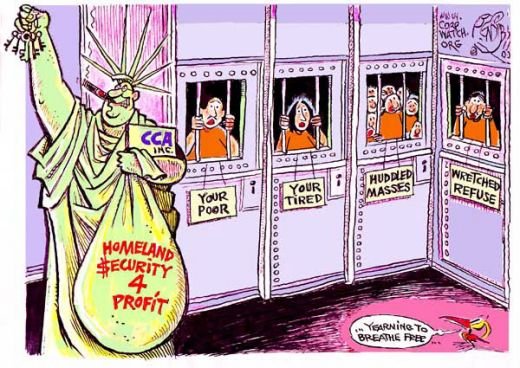
U.S society often produces public figures who, without denying their roots, acidly criticize the capitalist system as it exists in that country today. There are several examples, and it is curious that those voices are not silenced or refuted, one way or another, because of the high scientific and intellectual consideration they receive. This fact, together with their soundness and integrity, allow them to speak at length, and eventually to tackle certain subjects that are forbidden to less transcendent critics in the country, especially since the 9/11 attack limited the civil liberties.
One example of this is Paul Krugman’s recent statements. The well-known economist, basing his arguments on articles published in the New York Times and on his own observations, has openly declared that he is against the trending privatization of prisons. Krugman did not hesitate to classify as “terrifying” the reports about New Jersey’s system of “halfway houses” (they use this euphemism to refer to them) that function under a private regime, and compliment the regular system of prisons. “The horrors described are part of a broader pattern in which essential functions of government are being both privatized and degraded,” he stated. In other words, a right-wing campaign that tends to privatize what belongs to the state, including the prison system. Ironically, the author reminds us that the state’s governor said that these horrifying facilities are “representing the very best of the human spirit.”
Anger within the establishment sparked by this criticism had to stop due to the intellect behind it: Krugman is a professor at Princeton University; what’s more, he was awarded a Nobel Prize. At the margin of truth, it isn’t easy to refute someone who has been given so much recognition. The economist described prisons as “for-profit businesses” and, based on documents from contracted companies, said that “the interest of private prisons lies not in the obvious social good of having the minimum necessary number of inmates but in having as many as possible, housed as cheaply as possible.”*
As often happens, the initiative is getting attention south of the Rio Grande, where some speak of “changing an old model” and privatizing prisons. The news stirs further interest when we recall that, towards the end of the Menem administration (1989 to 1999), the same idea was put forth in Argentina. In the course of time, it was left behind, but surely it still beats in the drawer of some privatizing Neoliberal. In fact, not too long ago in the providence of Buenos Aires, a legislator said he was considering a project to contract out Buenos Aires prisons, so in need of more space, arguing that it has already been implemented in other countries and that the system began to work with smaller municipalities. The foundations of this are, obviously, a crude mercantilism, and endorse the idea of a “foolish State.”
The bill’s author has not read – or chooses to ignore – Krugman.
*Translator’s note: This quote comes from New Yorker columnist Adam Gopnik, rather than Paul Krugman, and can be found in his article “The Caging of America.”

Leave a Reply
You must be logged in to post a comment.